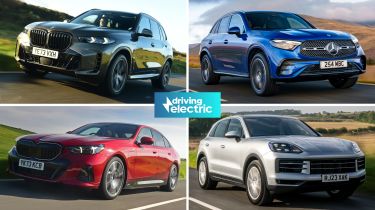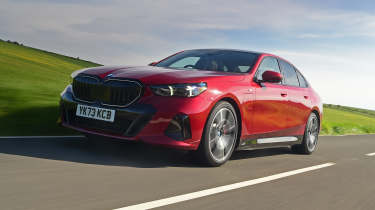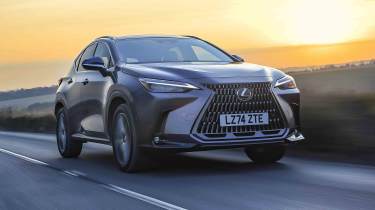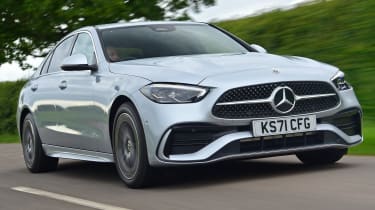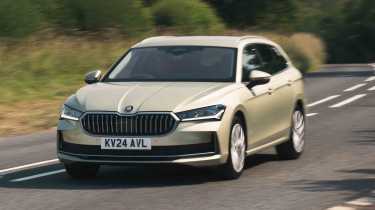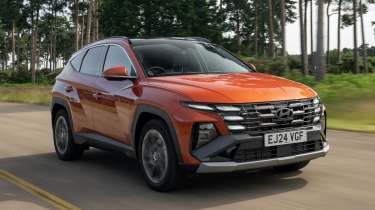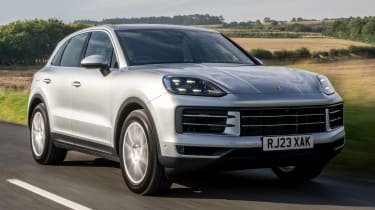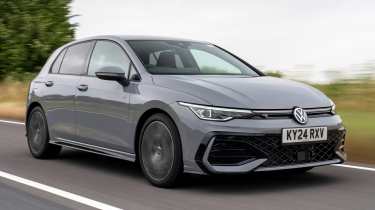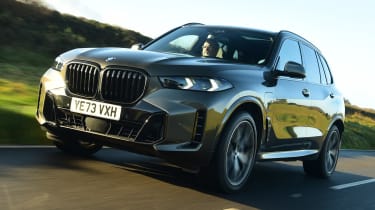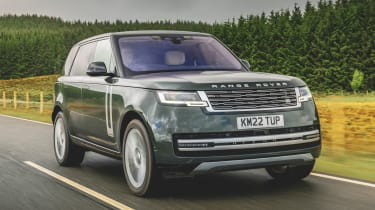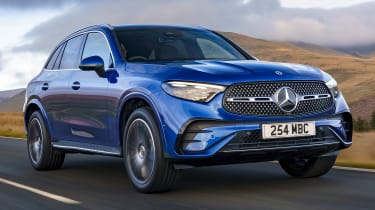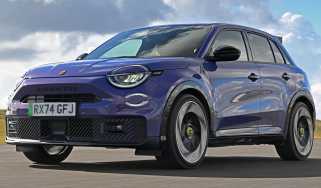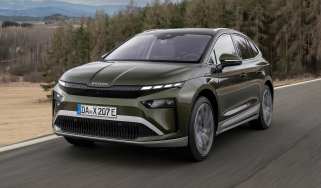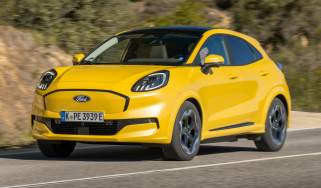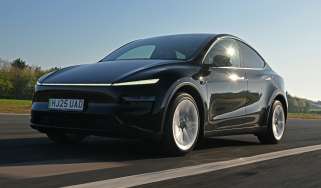Top 10 best hybrid cars 2025
The best hybrid cars will help reduce your fuel bills without needing to invest big bucks in a new electric car. These are our favourites…
Hybrid cars offer an accessible way to cut emissions and improve fuel economy without committing to a fully electric car. For those without easy access to chargers, limited home space for a wallbox or concerns over the high upfront cost of an EV, hybrids – or hybrid electric vehicles (HEVs) – provide a practical alternative. HEVs use electric motors alongside a petrol engine to boost efficiency, with no external charging required. Full hybrids (or ‘self-charging’ hybrids) can even drive short distances on electric power alone, while mild hybrids assist the petrol engine, but don’t run solely on electricity.
For greater electric range, plug-in hybrids (PHEVs) have larger batteries that can be charged externally, allowing for longer electric-only driving before the petrol engine kicks in. This gives drivers flexibility: full and mild hybrids offer straightforward efficiency gains, while PHEVs provide an extended electric option. Each hybrid type offers a step up in fuel savings and emissions reduction, making them an ideal bridge towards cleaner driving.
Best hybrid cars on sale now
See below for our breakdown of the best hybrid cars you can buy in the UK, all chosen by our team of expert testers. If you’re ready to make the switch to a full EV, then take a look at our list of the best electric cars.
1. BMW 530e
- Prices from £59,455
- Maximum WLTP combined electric range: 64 miles
The BMW 5 Series has been a staple for years, and with every new version, it only gets better. The latest 530e takes the luxury refinement we've come to expect from BMW and pairs it with both performance and everyday economy in a truly remarkable package. As a plug-in hybrid, the 530e does need to be plugged in to unlock its full potential, but you’ll be glad you did – on a full charge, it can cover an impressive 64 miles (WLTP) on purely electric power. With a fully charged battery, the 530e can achieve up to 353.1mpg (WLTP); when the battery is fully depleted, that figure drops to a still respectable 43.5mpg (WLTP).
The 530e isn’t just about efficiency, though, as it produces a formidable 295bhp and clocks a 0-62mph time of just 6.3 seconds. Despite its two-tonne weight, the BMW attacks corners brilliantly, with the poise of a lighter car, while offering a level of comfort rarely matched on the road today. Inside, the cabin exudes quality, featuring premium leathers and high-end materials that feel like they could have come straight from the 7 Series, along with a show-stopping 14.9-inch curved display for the infotainment system.
Read our full BMW 530e review to find out more.
2. Lexus NX 450h
- Prices from £49,995
- Maximum WLTP combined electric range: 55 miles
Few brands do hybrids as well as Lexus, and the latest NX 450h is another winner from the brand. This model strikes an ideal balance for hybrid ownership: if you’re someone who’s happy to plug in daily, the NX 450h offers an impressive quoted range of 55 miles on pure electric power – enough for most commutes. However, if daily charging isn’t feasible, it seamlessly shifts to full-hybrid mode, still delivering respectable fuel economy. In testing, the NX 450h achieved around 55mpg in full-hybrid mode, proving its efficiency even without regular charging.
Driving the NX 450h is a pleasant experience, particularly for those who prioritise refinement over sheer performance. While its fully charged 0-62mph time of 6.3 seconds won’t set pulses racing, it’s plenty quick enough for daily use. Lexus has tuned this model for a smooth, comfortable ride, and it delivers on both counts superbly well. Inside, the cabin is crafted with refined materials, giving the NX a genuinely premium feel. The infotainment system is intuitive and easy to use, with physical buttons adding a reassuringly simple navigation experience.
Read our full Lexus NX 450h review to find out more.
3. Mercedes C 300e
- Prices from £49,860
- Maximum WLTP combined electric range: 67.7 miles
The Mercedes C 300 e sets a new standard for compact plug-in hybrid saloons, offering an impressive manufacturer-quoted electric-only range of nearly 68 miles, thanks to its hefty 25.4kWh battery. In real-world testing, we managed to coax around 60 miles out of the battery, making electric-only commutes viable for many drivers. When it’s time for a longer journey, the solid 2.0-litre petrol engine seamlessly takes over, working with the electric motor to produce 309bhp and launching from 0-62mph in 6.1 seconds. Paired with a nine-speed automatic gearbox, that power is delivered smoothly, and the ride feels more stable and supple than the comparable BMW 3 Series.
With CO2 emissions down to just 13g/km, the C 300 e is also a good choice for company car drivers, fitting into the eight per cent Benefit in Kind (BiK) bracket. Inside, the impressive cabin features the Mercedes’ MBUX infotainment system with a 11.9-inch touchscreen for an intuitive user experience. That said, boot space is slightly compromised by the hybrid set-up, shrinking from 455 litres in the standard C-Class to 315 litres in the C 300 e.
Read our full Mercedes C 300e review to find out more.
4. Skoda Superb iV PHEV
- Prices from £36,175
- Maximum WLTP combined electric range: 84 miles
The Skoda Superb is a practical plug-in hybrid that truly shines with its spacious and inviting interior. Available exclusively in estate form, it has a generous 510-litre boot, making it perfect for everything from weekly grocery runs to transporting the family dog. The 1.5-litre petrol engine delivers 148bhp on its own, and when paired with the electric motor, the total output rises to a respectable 201bhp.
One of its standout features is the electric-only range of 82 miles, which makes daily commutes remarkably cost-effective. The Superb is also equipped with an impressive array of features, including a user-friendly infotainment system, smartphone connectivity and advanced safety options that have earned it a five-star NCAP safety rating. Evidence of Skoda’s solid build quality is apparent throughout the cabin, where well chosen materials contribute to an overall sense of refinement.
Read our full Skoda Superb review to find out more.
5. Hyundai Tucson
- Prices from £39,275
- Maximum WLTP combined electric range: 43 miles
The latest Tucson marks a big shift for the familiar model; whereas previously it was rather plainly styled and came with traditional petrol and diesel engines, this version boasts sharp styling and a choice of mild-hybrid, full-hybrid or plug-in-hybrid power. The Hybrid was first out of the blocks, with a 'Smartstream' 1.6-litre petrol engine paired with an electric motor and a 1.49kWh battery.
The hybrid drivetrain is very well executed; there’s a good amount of performance, with enough torque to make it feel faster than the on-paper 0-62mph time suggests. The engine doesn’t get thrashy as those in some other hybrids can, instead producing a tuneful exhaust note under acceleration. If a plug-in hybrid is your preference, the Tuscon can achieve over 40 miles on electric power alone – and if you keep it fully charged, Hyundai says that it’s capable of 201.8mpg. However, you aren’t likely to see that in your typical morning commute.
Read our full Hyundai Tucson review to find out more.
6. Porsche Cayenne
- Prices from £84,800
- Maximum WLTP combined electric range: 46 miles
It’s hard to think of a Porsche that hasn’t been brilliant. The brand seems to squeeze every ounce of performance from every model it produces, and the Cayenne plug-in hybrid is no exception. Even the entry-level Cayenne plug-in handles superbly, attacking corners as well as some of the best sports cars, and delivering a 0-62mph time of under five seconds, even on the basic model. Then there’s the top-of-the-range Cayenne Turbo E-Hybrid Coupé with GT Package, where the figures become even more absurd: 0-62mph in just 3.6 seconds and a mind-blowing 728bhp.
What’s truly great about the Cayenne isn’t just its performance – it’s how usable it is every day. When you switch from spirited driving to the morning commute, the car becomes remarkably comfortable. Despite the presence of some road noise, the standard suspension with the added PASM (Porsche Active Suspension Management) does a great job of providing a comfortable, smooth ride when you're cruising and firming things up when driving becomes a bit more spirited. The 18-way adjustable seats offer ample lumbar support and bolstering that really grips you. And with the latest facelift, Porsche has improved the Cayenne’s electric range, allowing up to 46 miles on electric power alone. Porsche claims it can achieve up to 201.8mpg, though that’s optimistic for typical daily driving.
Read our full Porsche Cayenne review to find out more.
7. Volkswagen Golf
- Prices from £37,135
- Maximum WLTP combined electric range: 88 miles
The Volkswagen Golf has been a staple of British roads since the 1970s, with each new version improving on the last. The latest Golf plug-in hybrid comes with an upgraded 19.7 kWh battery, allowing for up to 88 miles of electric-only range (WLTP) and a potential 94.2mpg if the battery’s kept regularly charged. The driving position is superb, with plenty of seat adjustment for optimal comfort, and there’s enough legroom in the back to seat two adults comfortably.
As with any Golf, it’s on B-roads where it really shines. The chassis is set up to absorb bumps beautifully, and the grip from the front axle is impressive, to say the least. The basic Golf plug-in hybrid goes from 0-62mph in 7.2 seconds, producing a combined 201bhp from its 1.5-litre petrol engine and electric motor. For added performance, the Golf GTE model pushes out 268bhp (7bhp more than the petrol Golf GTI) and does 0-62mph in a brisk 6.6 seconds.
Read our full Volkswagen Golf review to find out more.
8. BMW X5
- Prices from £82,055
- Maximum WLTP combined electric range: 62 miles
Since its arrival in 1999, the BMW X5 has been one of the key models in setting the template for the premium SUVs we see today. Its generous dimensions and four-wheel-drive performance helped it pioneer the luxury SUV segment, and it remains one of the most desirable cars on the road today. The latest X5 includes the plug-in hybrid xDrive50e model, which offers an electric range of up to 62 miles and an impressive claimed 313.9mpg (WLTP), ideal for those seeking a balance of performance and efficiency.
The X5 xDrive50e comes with adaptive suspension as standard, ensuring a smooth and refined drive on motorways while firming up in Sport mode for a more engaging experience on twisty roads. Performance is strong, with a 0-62mph time of just 4.8 seconds. With 483bhp and 700Nm of torque on tap, it’s an impressive package for a vehicle that weighs nearly two-and-a-half tonnes.
Read our full BMW X5 review to find out more.
9. Range Rover
- Prices from £115,805
- Maximum WLTP combined electric range: 73 miles
The Range Rover has set the standard for luxury SUVs, and the latest model lives up to this reputation with a beautifully refined cabin. Inside, plush materials and high-quality leather provide a serene ambience, while the advanced suspension smooths out even the roughest roads, making every journey feel effortless. For an SUV of this size, the Range Rover’s plug-in hybrid system achieves impressive efficiency, claiming up to 329mpg with a full charge. And if you want to drive on EV power alone, you can travel up to 73 miles without the engine kicking in.
Despite its considerable proportions, it’s no slouch on the road, either - the P440e model accelerates from 0-62mph in a swift six seconds, while the P510e cuts that down to 5.5 seconds, thanks to its powerful 38.2kWh battery and petrol-electric combo. Boot space is as generous as you’d expect from a Range Rover; the standard model offers 725 litres, while the long-wheelbase version expands to a remarkable 2,601 litres when the rear seats are folded down, providing more than enough room for any adventure.
Read our full Range Rover review to find out more.
10. Mercedes GLC
- Prices from £58,860
- Maximum WLTP combined electric range: 77.6 miles
In today’s crowded mid-size SUV market, it’s hard to stand out, but Mercedes has crafted the GLC to rise above the rest with its top-tier cabin and eye-catching style. From the moment you get in, you’ll notice the elegant design, enhanced by ambient lighting and featuring a large, 11.9-inch central infotainment screen paired with a 12.3-inch digital instrument display behind the wheel.
Yet the GLC isn’t just about aesthetics. The GLC 300e plug-in hybrid comes equipped with a hefty 31kWh battery, allowing for nearly 80 miles on electric power alone. When the battery is kept charged, it can claim an impressive 565mpg (WLTP), working in tandem with its 2.0-litre petrol engine. Performance is strong, too, with the 254bhp petrol engine and 134bhp electric motor combining for a total of 388bhp, getting you from 0-62mph in a swift 6.7 seconds.
Read our full Mercedes GLC review to find out more.

